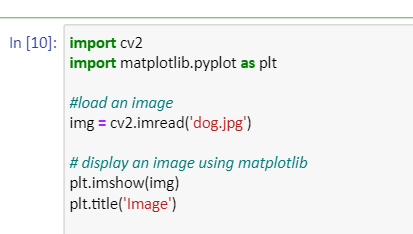There is a difference in pixel ordering in opencv and matplotlib.
Opencv imshow matplotlib.
See interpolations for imshow matshow for an overview of the supported interpolation methods.
So let s load up an image using opencv and display it with matplotlib.
On a 2d regular raster.
Import cv2 image cv2 imread chelsea the cat png plt axis off plt imshow image plt show again the code is simple.
But the results aren t as expected.
The imshow function in pyplot module of matplotlib library is used to display data as an image.
The origin will coincide with the center of pixel 0 0.
Some interpolation methods require an additional radius parameter which can be set by filterrad.
Therefore when we display an image loaded in opencv using matplotlib functions we may want to convert it into rgb mode.
It will be a grayscale image and it won t give much idea what colors are there unless you know the hue values of different colors.
Opencv follows bgr order while matplotlib likely follows rgb order.
The input may either be actual rgb a data or.
Unless extent is used pixel centers will be located at integer coordinates.
Using cv imshow the result we get is a two dimensional array of size 180x256.
Method 2.
Here i will show how to implement opencv functions and apply them in various aspects using some great examples.
How to display a matplotlib rgb image using opencv in python this post will be helpful in learning opencv using python programming.
So we can show them as we do normally using cv imshow function.
There are two common representations for rgb images with an alpha channel.
Matplotlib pyplot imshow matplotlib pyplot imshow x cmap none norm none aspect none interpolation none alpha none vmin none vmax none origin none extent none filternorm true filterrad 4 0 resample none url none data none kwargs source display data as an image i e on a 2d regular raster.
Matplotlib pyplot imshow x cmap none norm none aspect none interpolation none alpha none vmin none vmax none origin none extent none shape filternorm 1 filterrad 4 0 imlim resample none url none data none kwargs.

